Fantasia 2018, Day 21, Part 2: Heavy Trip and Madeline’s Madeline
 I had time for one more movie in the Fantasia screening room before I’d head over to the J.A. De Sève Theatre to watch a film called Madeline’s Madeline, an experimental film about a girl in a theatre group struggling to define herself. It’d be the last movie I’d see in the De Sève at this year’s festival, but before it started I opted to watch a Finnish comedy about death metal. (There’s a reason for that choice, involving the final film of the festival; more on that in a few posts.)
I had time for one more movie in the Fantasia screening room before I’d head over to the J.A. De Sève Theatre to watch a film called Madeline’s Madeline, an experimental film about a girl in a theatre group struggling to define herself. It’d be the last movie I’d see in the De Sève at this year’s festival, but before it started I opted to watch a Finnish comedy about death metal. (There’s a reason for that choice, involving the final film of the festival; more on that in a few posts.)
Heavy Trip was directed by Juuso Laatio and Jukka Vidgren, who also wrote the movie with Jari Olavi Rantala and Aleksi Puranen. Turo (Johannes Holopainen) is the singer of a four-man death metal band in a northern town in Finland. They’ve been rehearsing for twelve years under the reindeer slaughterhouse owned by the family of guitarist Lotvonen (Samuli Jaskio) — “your playing makes the reindeer want to kill themselves,” they’re told cheerfully. Early in the movie they finally write their first song, though they still don’t have a name when chance brings the promoter of a Norwegian metal festival to the slaughterhouse. Through a series of lies and misunderstandings, the idea percolates through the town that Turo’s band, now calling themselves Impaled Rektum, will be playing the festival. They won’t; but will the band’s newfound fame lead Turo to finally confess his love for Miia (Minka Kuustonen) before she’s stolen away by the local big man, Jouni (Ville Tiihonen)? And what happens when the truth finally comes out?
There’s a pleasant tone to the movie, which is surprisingly quiet for a film about metal. The band members — which also include hellraiser drummer Jynkky (Antti Heikkinen) and a bassist, Pasi (Max Ovaska) AKA Xytrax, with an encyclopedic knowledge of his chosen music genre — are unexpectedly unaggressive. Sometimes that’s taken too far; the running gag of Turo puking whenever he takes the stage is obvious, for example. Still, the band members are at least established as characters, with their main personality traits defined. Unfortunately, they’re then given very little to do.
It feels as though not much happens through the first two thirds of the movie. That’s illusory, to an extent. Characters are introduced, one dies, Turo’s love for Miia is set up, Jouno does his best to ruin the band’s dreams, and so on and so forth. But it’s sluggishly-paced, and not especially interesting. The movie plays things too straight; it’s aware of the absurd things the characters do, but nobody reacts to any of it (I will concede that this might play better with an audience to do the reacting instead). As a character, Turo’s too passive to hold much interest. And the idea of the Norwegian festival is too prominent; one waits for the band to hit the road to go to play a festival, rather than waste time sitting around their hometown. The name of the movie is Heavy Trip, but the trip you’d expect doesn’t come along until the third act.
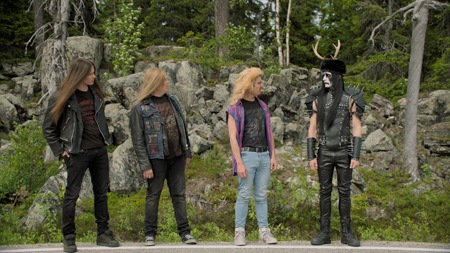 When it does finally arrive, it’s easily the best part of the film. An air of mad surrealism takes over. Gags and improbable coincidences pile on top of each other. The band hurtles from one weird situation to another, stumbling toward the metal festival — and that all works. The structure of the road trip gives the movie a literal momentum. One wishes it had spent more of its 92-minute runtime on the road, rather than idling around the village.
When it does finally arrive, it’s easily the best part of the film. An air of mad surrealism takes over. Gags and improbable coincidences pile on top of each other. The band hurtles from one weird situation to another, stumbling toward the metal festival — and that all works. The structure of the road trip gives the movie a literal momentum. One wishes it had spent more of its 92-minute runtime on the road, rather than idling around the village.
Unfortunately, the movie focusses its interest in delivering a message about seizing the day. This is odd, since one of the early reflections we get from Turo in voice-over establishes who he is directly and what’s important to him: “Other guys can play hockey and drive around chasing pussy. We play metal.” That’s a sentiment I expect I’ll be able to relate to for as long as Marc Bergevin remains General Manager of the Montreal Canadiens, but it sets up who Turo is and who his bandmates are — and then it turns out to only be who they want to think they are, and the movie spends an hour on them raising the courage to try to live that dream. Their dedication to music isn’t dramatised; all we know is that they’ve never made it out of the basement. Do they actually care about metal, or not? And specifically, do they care enough to take the risk of playing live?
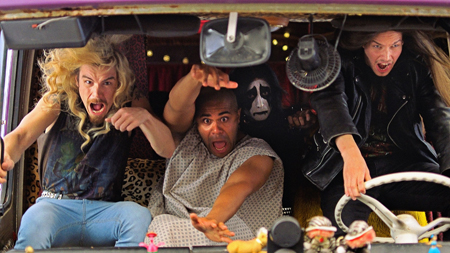 The frustrating thing about this movie is that it takes too long to answer this question, and doesn’t really answer it in an interesting way. I suppose it’s possible to see humour in the contrast between a quiet film about musicians deciding to get serious, and the extreme unquietness of metal. But even that doesn’t come out much. And so the film spins its wheels until the road trip finally gets underway.
The frustrating thing about this movie is that it takes too long to answer this question, and doesn’t really answer it in an interesting way. I suppose it’s possible to see humour in the contrast between a quiet film about musicians deciding to get serious, and the extreme unquietness of metal. But even that doesn’t come out much. And so the film spins its wheels until the road trip finally gets underway.
There are some nice set-pieces, a few good gags, but also some clunkers — a fight with a wolverine in a zoo is fake in an unfunny way, for example. Two of the best jokes are swipes from better (rock comedy) movies. Turo’s love life is uninteresting, and feels disconnected from the story of the band deciding to make a go of it as music. As he’s told at the end: “Metal first! Girls later!” One wishes the creators had listened to themselves.
And yet I felt that the movie’s use of metal was fitful. Metal references aren’t that plentiful, and feel random; I have no idea whether the writers are fans of metal or not, and that’s actually a problem — if should be obvious, and would be if the movie had mined its subject more skillfully. I’m not looking for minutiae that would make the movie less accessible, just a point of view on the music at its core. It’s cute that Pasi’s the only one who dresses up in corpsepaint and has an alter ego, and it’s cute that in a form overflowing with subgenres he defines Impaled Rektum’s sound as “symphonic postapocalyptic reindeer-grinding Christ-abusing extreme war pagan Fennoscandian metal.” But these moments are too few and far between.
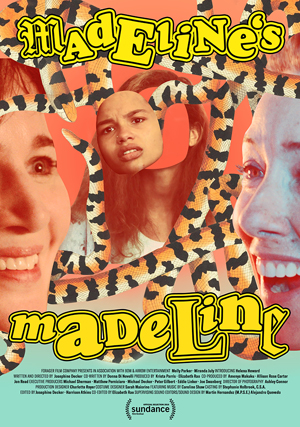 There are good things here. If the actors underplay, for the most part they do it well. The cinematography and camera placement are fine, and the movie’s always visually interesting. The band’s consistently sympathetic, and Turo’s final comeback to a pack of homophobic toughs is excellent. There are good moments here. But, for me, too few.
There are good things here. If the actors underplay, for the most part they do it well. The cinematography and camera placement are fine, and the movie’s always visually interesting. The band’s consistently sympathetic, and Turo’s final comeback to a pack of homophobic toughs is excellent. There are good moments here. But, for me, too few.
I found a completely different experience waiting for me at the J.A. De Sève. Madeline’s Madeline was directed by Josephine Decker. She wrote the film, too, though in talking about the making of the film she’s stressed the collaborative element of the process and how she worked with her cast. That sounds like it could have turned into a mess, but in this case it emphatically did not. Madeline’s Madeline is one of the most remarkable films I’ve seen this year, messy but intricate, relentlessly focussed on character, and built around a jaw-dropping lead performance.
The basic story’s simple. Madeline (Helena Howard) is a sixteen-year old in an experimental acting troupe led by Evangeline, who sees a rare talent in the girl. As Madeline struggles with mental health issues, she’s torn between Evangeline and her mother, Regina, who is trying to raise her on her own. Fundamentally, though, Madeline’s trying to grow up and find herself: not Evangeline’s Madeline or Regina’s Madeline, but Madeline’s Madeline.
The film moves through a series of events largely triggered by Regina’s protectiveness, Evangeline’s manipulativeness, and Madeline’s struggle with her own reality. Evangeline grows more and more obsessed with Madeline’s talent, tearing down the theatre piece the group’s evolving to make new structures increasingly focussed on Madeline. She takes her to a party at her home, while Madeline gets into an argument with her mother and the group wonders about the morality of a White director trying to build a show exploiting a biracial girl like Madeline.
Watching the movie, you wonder how much art imitates life. The movie is structured around Howard, who demonstrates colossal skill, especially for younger actor; she conveys the many pressures on Madeline and the different things going on with her. Not only does Madeline have to deal with the conflicts and pressures of the adults in her life, and not only has she had mental health issues that left her hospitalised for weeks, she’s also experimenting with her sexuality and generally acting out as teenagers tend to do. Howard’s able to get across the complexity of Madeline at every moment, and the way the different facets of her interrelate.
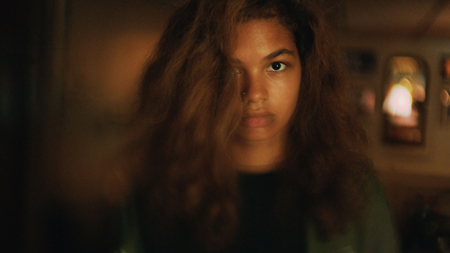 The script’s allusive more than discursive, giving Howard and Decker room to build the character visually rather than through exposition or direct dialogue. It’s a film that lives in subtext, indeed perhaps makes more sense when subtext is followed instead of overt plot, and both Howard and Decker develop that subtext in surprising ways. Decker’s camerawork is almost oppressive in its focus on the characters, their faces and forms always uppermost. Handheld camera brings us into their points of view, which is a key concern of the film — Madeline’s subjectivity, her self-construction, but also the masks of theatrical tradition and the way actors build characters from behind a mask. Either way, the film’s built much more of close-ups than of vistas. It’s quietly precise, too, each movement drawing us into the perspective of the characters while also showing us details in the background; Madeline’s home has marks on the wall showing her height when she was growing up, not only establishing the hominess of the place and Madeline’s history there but also subtly establishing the theme of the film: Madeline’s growing up, and her relationship with her family’s changing.
The script’s allusive more than discursive, giving Howard and Decker room to build the character visually rather than through exposition or direct dialogue. It’s a film that lives in subtext, indeed perhaps makes more sense when subtext is followed instead of overt plot, and both Howard and Decker develop that subtext in surprising ways. Decker’s camerawork is almost oppressive in its focus on the characters, their faces and forms always uppermost. Handheld camera brings us into their points of view, which is a key concern of the film — Madeline’s subjectivity, her self-construction, but also the masks of theatrical tradition and the way actors build characters from behind a mask. Either way, the film’s built much more of close-ups than of vistas. It’s quietly precise, too, each movement drawing us into the perspective of the characters while also showing us details in the background; Madeline’s home has marks on the wall showing her height when she was growing up, not only establishing the hominess of the place and Madeline’s history there but also subtly establishing the theme of the film: Madeline’s growing up, and her relationship with her family’s changing.
The movie begins with a line spoken over darkness: “What you are experiencing is not a metaphor,” we’re told, and this turns out to be Evangeline giving direction to Madeline in an acting exercise: “You are not the cat, you are inside the cat.” Again and again through the movie Madeline reverts to this exercise, taking on the persona of a cat (occasionally pig, occasionally turtle). So this is a beginning about acting and masks, about being inside an actor as they become something other than they are, and this is appropriate because among other things this movie is a love letter to the power of acting. To what actors can bring, but also to the way everyone acts and crafts their character of themselves, consciously or not. But also this is a strong beginning because it ably sets up ideas and images that recur through the film — the cat, the mask, the idea of acting, the idea of metaphors and experience.
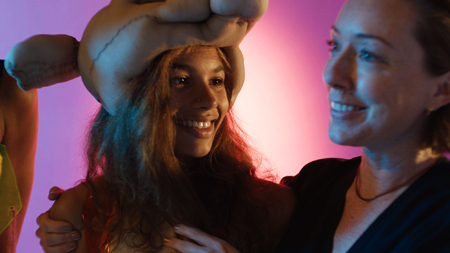 This is a film where everything rhymes. More than a formal plot, it seems built on patterns of imagery that develop more and more fully as the movie goes along. Consider a scene where Madeline leads two boys to a basement room her father once occupied, containing the porn he used to enjoy; she shows them part of a movie built around a hospital scenario before her mother turns up and chases the boys away (“they’re not porn freaks,” Madeline later defends them to Regina, “more like … porn scholars.”). So the scene brings together Madeline’s absent father, hints at the relationship between the father and Regina, shows Madeline working through her own sexual feelings, and then also links sexuality and performance: Madeline presents the film to the boys like a director. But then the video she shows them, with its medical theme, echoes mentions of her own hospitalisation, and anticipates an exercise the theatre troupe does based around doctors and nurses. You can start with any part of this film and trace the resonances to any other part.
This is a film where everything rhymes. More than a formal plot, it seems built on patterns of imagery that develop more and more fully as the movie goes along. Consider a scene where Madeline leads two boys to a basement room her father once occupied, containing the porn he used to enjoy; she shows them part of a movie built around a hospital scenario before her mother turns up and chases the boys away (“they’re not porn freaks,” Madeline later defends them to Regina, “more like … porn scholars.”). So the scene brings together Madeline’s absent father, hints at the relationship between the father and Regina, shows Madeline working through her own sexual feelings, and then also links sexuality and performance: Madeline presents the film to the boys like a director. But then the video she shows them, with its medical theme, echoes mentions of her own hospitalisation, and anticipates an exercise the theatre troupe does based around doctors and nurses. You can start with any part of this film and trace the resonances to any other part.
The rehearsals and exercises in the performance space are perhaps the most important examples. Space and time and reality seem to become dreamlike here as we move in and out of Madeline’s perceptions. The playing she does with the actors gets into her head, as their activities echo the events of her past. An early question-and-answer session with an ex-con brought in to talk to the actors about his life experiences is resonant: he most regrets, he says, associations with certain people. There’s a sense in which Madeline’s trying to get out of a kind of prison, perhaps, but certainly also a sense in which the film is her working out her association with people. But that sort of discussion is as nothing next to the depth Decker gives us in the acting exercises, particularly the last, in which Madeline seems to make a play for independence, for self-control: she constructs a play-within-the-film in which all the symbols and subtexts are brought nicely to a head.
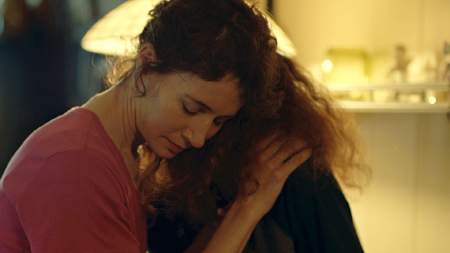 It has to be said that this is not a movie for everyone. It’s elliptical at times and doesn’t try to be polished; it lets its symbols loom large in the narrative. It’s not a movie that concedes to audience expectations, in other words. But as a result, it’s a great film, with a remarkable depth and a precision of editing, carrying multiple tracks of meaning forward at once.
It has to be said that this is not a movie for everyone. It’s elliptical at times and doesn’t try to be polished; it lets its symbols loom large in the narrative. It’s not a movie that concedes to audience expectations, in other words. But as a result, it’s a great film, with a remarkable depth and a precision of editing, carrying multiple tracks of meaning forward at once.
There’s a violent dream that may not be a dream that Madeline shares with Evangeline; Evangeline reacts by trying to analyse it with Jungian concepts. It’s a perfect reaction because it’s what the character would do, and also perfectly wrong in a way she wouldn’t see. How much Jung has to do with the movie specifically I’m not sure, but his general interest in the subconscious is I think relevant; he wrote about trying to integrate the psyche, which is Madeline’s task. Howard, alternately childlike and adult and both at once, brings that across magnificently. She’s central, and owns the film in the way I suspect older actors might struggle with. This is a remarkable work of cinema, about art and acting and the development of spirit, and it’s only right that such a performance should be at its heart.
Find the rest of my Fantasia coverage here!
Matthew David Surridge is the author of “The Word of Azrael,” from Black Gate 14. You can buy his first collection of essays, looking at some fantasy novels of the twenty-first century, here. His second collection, looking at some fantasy from the twentieth century, is here. You can find him on Facebook, or follow his Twitter account, Fell_Gard.